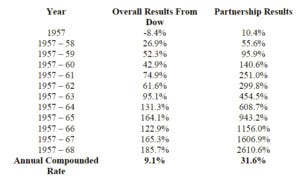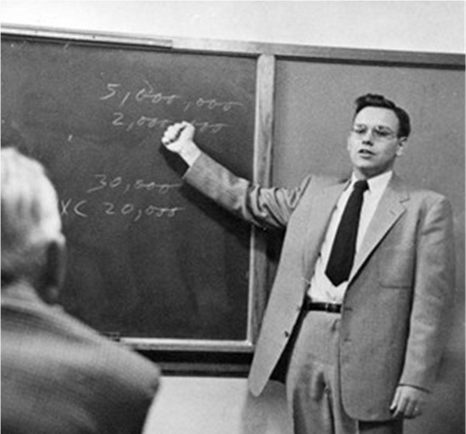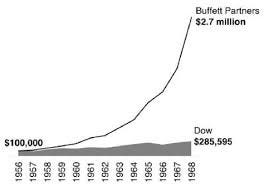Investment Wisdom from the OG
Key take-aways from the Buffett Partnership Letters
Warren Buffett is the well known investor that has led Berkshire Hathaway from a worn down old textile manufacturer to the behemoth conglomerate today. Making anyone who invested with him along the way rather rich, and in some instances, monopoly man-esque obscenely rich.
His longevity and durability throughout the decades has meant he has compounded his wealth like no other. He did no get rich quick, but rather slowly and consistently and without unnecessary risk.
Buffett famously started investing as a teenager and quickly moved to a partnership model. Below are some interesting snippets of wisdom from his early partnership letters that have stood the test of time.
If the general market were to return to an undervalued status our capital might be employed exclusively in general issues and perhaps some borrowed money would be used in this operation at that time. Conversely, if the market should go considerably higher our policy will be to reduce our general issues as profits present themselves and increase the work-out portfolio. All of the above is not intended to imply that market analysis is foremost in my mind. Primary attention is given at all times to the detection of substantially undervalued securities.
1957
This one is interesting as it demonstrates how he actually does observe what is happening in markets broadly but doesn’t try to predict anything about the future of the markets. He also mentions how what he would be doing would depend somewhat on overall market sentiments at the time but that the focus of his time would looking for valuable stocks to buy aka “undervalued securities”.
During the past year almost any reason has been seized upon to justify “Investing” in the market. There are undoubtedly more mercurially-tempered people in the stock market now than for a good many years and the duration of their stay will be limited to how long they think profits can be made quickly and effortlessly.
1958
You can almost sense the fear and dread in the words on the page as he laments an overly optimistic Mr. Market. This is something most people struggle to guard against - the animal spirits that push people’s emotions upwards with the momentum of an increasing stock market. He isn’t suggesting any doom and gloom, rather a more difficult future of lower expected returns given the higher current valuations.
I would rather sustain the penalties resulting from over-conservatism than face the consequences of error, perhaps with permanent capital loss, resulting from the adoption of a "New Era" philosophy where trees really do grow to the sky.
1959
This one points out his willingness to be conservative, to wait for the fat pitch when times are euphoric. The consequences of error in this case being the missing out of gains that others are currently enjoying (seems topical).
First, one year is far too short a period to form any kind of an opinion as to investment performance, and measurements based upon six months become even more unreliable. One factor that has caused some reluctance on my part to write semi-annual letters is the fear that partners may begin to think in terms of short-term performance which can be most misleading. My own thinking is much more geared to five year performance, preferably with tests of relative results in both strong and weak markets.
1961
The guy thinks long term. No doubt about that. And he is also pointing out that you really can’t judge performance over such short periods as a trip around the sun. Mr. Market is far too moody to represent anything rational about an investment over short periods, it takes time to get some correlation to business performance.
Over any long period of years, I think it likely that the Dow will probably produce something like 5% to 7% per year compounded from a combination of dividends and market value gain. Despite the experience of recent years, anyone expecting substantially better than that from the general market probably faces disappointment.
1962
The guy understands base rates and does not fall victim to its fallacy. He also demonstrates some humility and this is a common theme in much of what he has done over his career - under promise and overdeliver.
I cannot promise results to partners. What I can and do promise is that:
a. Our investments will be chosen on the basis of value, not popularity;
b. That we will attempt to bring risk of permanent capital loss (not short-term quotational loss) to an absolute minimum by obtaining a wide margin of safety in each commitment and a diversity of commitments; and
c. My wife, children and I will have virtually our entire net worth invested in the partnership
1963
This one demonstrates to readers the value of integrity. You want that in someone you are trusting your hard earned money with. He has also laid out in simple terms how he has aligned his incentives with yours. This is a good lesson when searching for top management - skin in the game matters for the best capital allocation.
What we really like to see in situations like the three mentioned above is a condition where the company is making substantial progress in terms of improving earnings, increasing asset values, etc., but where the market price of the stock is doing very little while we continue to acquire it.
1964
Thinking like a business owner and not a stock owner. You don’t get rich long term by trying to time market prices for stocks. You want to own businesses that are performing underneath and becoming more and more valuable.
group decisions - my perhaps jaundiced view is that it is close to impossible for outstanding investment management to come from a group of any size with all parties really participating in decisions
1965
I love this one. Great decisions are rarely made by groups. Mediocre or bad ones often are. You must think for yourself!
Be sure to follow me on twitter @MoS_Investing
If you enjoyed this writing, please share and subscribe for more free content sent directly to your inbox.
P.S. If you liked this one, you may also enjoy my dive into another great capital allocator, Mark Leonard from Constellation Software.







